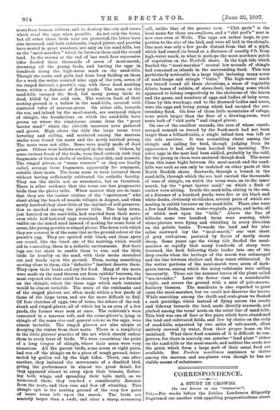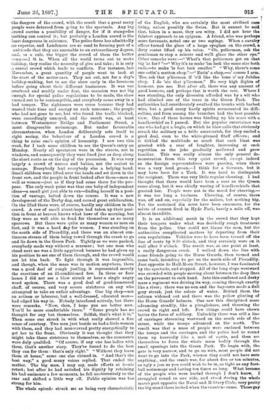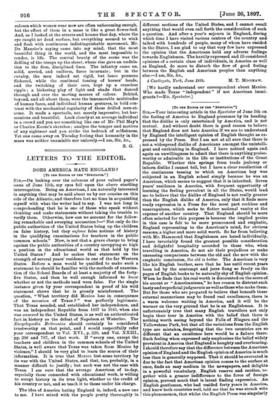CORRESPONDENCE.
A STUDY IN CROWDS.
[TO TRX EDITOR OF TIM " SPECTATOR:1
SIR,—For weeks before the Jubilee Londoners diligently frightened one another with appalling prognostications about the dangers of the crowd, with the result that a great many people were deterred from going to the spectacle. Any big -crowd carries a possibility of danger, for if it stampedes clothing can control it; but probably a London crowd is the least dangerous in existence. The police force has admittedly rao superior, and Londoners are so used to forming part of a nultitude that they are amenable to an extraordinary degree, ate:, as a rule, the bigger the crowd of them the better tempers./ it is. When all the world turns out to make 'holiday, they realise the necessity of give and take ; it is only a casual crowd which leads to conflicts. For instance, last November, a great quantity of people went to look at the-start of the motor-cars. They set out, not for a day's holiday-making, but to see the show early in the forenoon before going about their different businesses. It was wet 4overhead and muddy under foot, the occasion was not big -enough for special police regulations to be made, the show turned out to be contemptible, and everybody came away in a bad temper. The sightseers were cross because they had wasted their time and energy on such nonsense; the people who had not gone to see, but who found the traffic blocked, were exceedingly annoyed, and the result was, at least between Westminster Bridge and Parliament Street, a most disagreeable scrimmage. But under favourable circumstances, when London deliberately sets itself to sight seeing, the behaviour of a London crowd is a thing to raise one's opinion of humanity. I saw two this -week, for I took some children to see the Queen's entry on Monday. Nearly all spectators were in the streets, not in windows, and consequently they were lined just as deep along the short route as on the day of the procession. It was very largely a crowd of nurses and babies, not the easiest to manage. Everybody lent everybody else a helping hand. -Small children were lifted over the heads and set down in the front row, and the people in front looked after them—men as well as women—just as if they had come there for the pur- pose. The only weak point was that one baby of independent ideas—a small girl just able to run—finding herself in a posi- tion of vantage, bolted down the course. It was a new -development of the Derby dog, and caused great exhilaration. On the 22nd there were, of course, hardly any children in the crowd. A row of small street-boys had taken up their posi- tion in front at heaven knows what hoer of the morning, but they were as well able to fend for themselves as so many -sparrows. But there were quite as many women as men on foot, and it was a bard day for women. I was standing on the south side of Piccadilly, and there was an almost con- tinuous stream of them being towed through the crush to go and lie down in the Green Park. Tightly as we were packed, everybody made way without a murmur; but one man who stood next use was a little aggrieved because he had given up his position to see one of them through, and the crowd would not let him back. To fight through it was impossible, and though, when the mass was in motion anywhere, there was a good deal of rough jostling, it represented merely the exertions of an ill-conditioned. few. In three or four 'hours I did not see a blow struck or hear a single angry word spoken. There was a good deal of good-humoured chaff, of course, and very severe strictures on any who attempted to take an unfair advantage. One big chap—not an artisan or labourer, but a well-dressed, educated man— had edged his way in. Nobody interfered actively, but there were remarks. "Now, then, I hope you see better now. You'll be more comfortable there." "Some people has no thought for any but themselves. Selfish, that's what it is." Then some one struck in with what really showed a fine sense of courtesy. Two men just beside us had a little woman with them, and they had manceuvred pretty energetically to get her to the front. Obviously it was thought that they might take these strictures to themselves, so the comments were duly qualified. "Of course, if any one has ladies with them, that's another story. They're bound to do the best they can for them : that's only right." "Without they leave them at home," some one else chimed in. "And that's the best way," a good many voices replied. That ended the matter. The big man, I may say, made efforts at ironic retort; but after he had satisfied his dignity by retaining his bad eminence a few moments, he fell unobtrusively to the rear and shifted a little way off. Public opinion was too strong for him.
The whole episode struck me as being very characteristic
of the English, who are certainly the most civilised race living, unless possibly the Swiss. But it cannot be said, that, taken in a mass, they are witty. I did not hear the faintest approach to an epigram. A friend, who was perhaps more fortunate, noted one or two sayings. When a cavalry officer turned the glare of a large eyeglass on the crowd, a 'dirty coster lifted up his voice. "Oh, policeman, ask the' gentleman to stop a minute and we'll glaze the other eye." Other remarks were :—" What's that policeman got on that big 'at for? "—" Why it's to make 'im look the same size both ends,—to make 'is feet look smaller." "Why, there's some one eatin' a mutton chop."—" Eatin' a chop,—o' course I arm. 'Ere, ask that p'liceman if 'e'd like the bone o' my Jubilee chop. I do 'ate that p'liceman." No very high flights of humour, you see. But after all, there was any amount of good humour, and perhaps that is worth the rest. Where I was standing, the only diversion afforded was by a wit who had climbed one of the trees in the Green Park. The authorities bad considerately swathed the trunks with barbed wire, but a good many hardy spirits surmounted its diffi- culties, and from among the branches had the best possible view. One of these heroes was binding up his scars with a handkerchief as I passed. But the popular entertainer was one who bad got a bugle, on which he blew calls that obviously struck the military as a trifle amateurish, for they smiled a good deal, even to the white-plumed Staff officers ; and it tickled the multitude so much that each blast was greeted with a roar of laughter, increasing at each repetition as the joke gradually mellowed and grew familiar. This was really almost the only general de- monstration from this very quiet crowd, except indeed as the foreign representatives were passing, when there was a very loud groan,—I think for a German, but it may have been for a Turk. It was hard to distinguish the recipient. There was very little regular cheering. I had thought that there would have been a roar as the Queen came along, but it was chiefly waving of handkerchiefs that greeted her. People were not in the mood for cheering,— it was too long a business. Cheering, of course, there was, off and on, especially for the sailors, but nothing big. Yet the sustained din must have been enormous, for the salute of cannon fired in Hyde Park, barely a mile off, was almost inaudible.
It is an additional merit in the crowd that they kept their tempers under what was decidedly rough treatment from the police. One could not blame the men, but the authorities complicated matters by departing from their own regulations. Vehicles were to have been turned off the line of route by 830 o'clock, and they certainly were on it well after 9 o'clock. The result was, at one point at least, a really dangerous crush. I walked down the line with, some friends going to the Horse Guards, then turned and came back, intending to get on the north side of Piccadilly. Just opposite to Half-Moon Street, however, I was fascinated by the spectacle, and stopped. All of the long slope westward was crowded with people moving about between the deep lines on the pavement to each hand. Into this confused and dusky mass a regiment was driving its way, coming through exactly like a river; there was no sun and the bayonets made a dull grey streak, just the colour of water. Behind them the column widened out and there was the yellow glinting of the Horse Guards' helmets. One saw this disciplined mass advancing steadily, like a ploughshare, and throwing the crowd to right and left. Few things could have shown better the force of soldiery. Unluckily there was still a line of carriages streaming westward on the south side of the street, while the troops advanced on the north. The result was that a mass of people were enclosed between the troops and the carriages, and the police had to round them up hurriedly like a mob of cattle, and then set themselves to force the whole mass bodily through the small openings into the Green Park. To begin with, the gate is very narrow, and to go on with, most people did not want to go into the Park, whence they could not have seen anything, and the result was, for about five or ten minutes, as ugly a jam as you could wish to be in, as tight as any foot- ball scrimmage and lasting ten times as long. What became of the people who were hurled through I don't know; I struggled round to one side, and stood during the whole march past opposite the Naval and Military Club; very pretty the big stand there looked when the puushin0 came. Those gay
colours which women wear now are often unbecoming enough, but the effect of them in a mass is like a great flower-bed. And, as I looked at the streets and houses that day, where the eye caught no dead surface, but everything seemed to wink and flash with continuous indistinguishable movement, Mr. Du Manner's saying came into my mind, that the most beautiful thing in the world, and the most impossible to render, is life. The central beauty of the scene was the defiling of the troops up the street, whose rise gave an undula- tion to the firm, disciplined lines. The infantry came on, solid, serried, and uniform, force incarnate ; but in the cavalry, the men indeed sat rigid, but lance pennons flickered, while the continual tossing of horses' heads, and the twitching of their ears, kept up a ceaseless ripple ; a bickering play of light and shade that danced through and over the moving masses of colour. Behind, beyond, and all about them, were the innumerable multitudes of human faces, and individual human gestures, in bold con- trast with the mechanical regularity of these drilled men-at- arms. It made a spectacle, not merely impressive, but har- monious and beautiful. Look closely at an average individual in a crowd and you see something like one of Mr. Phil May's or Charles Keene's sketches ; analyse the temper and motives of any sightseer and you strike the bedrock of selfishness. Yet one came away on Tuesday feeling that humanity in the mass was neither unamiable nor unlovely.—I am, Sir, Szc., S. G.




















































 Previous page
Previous page